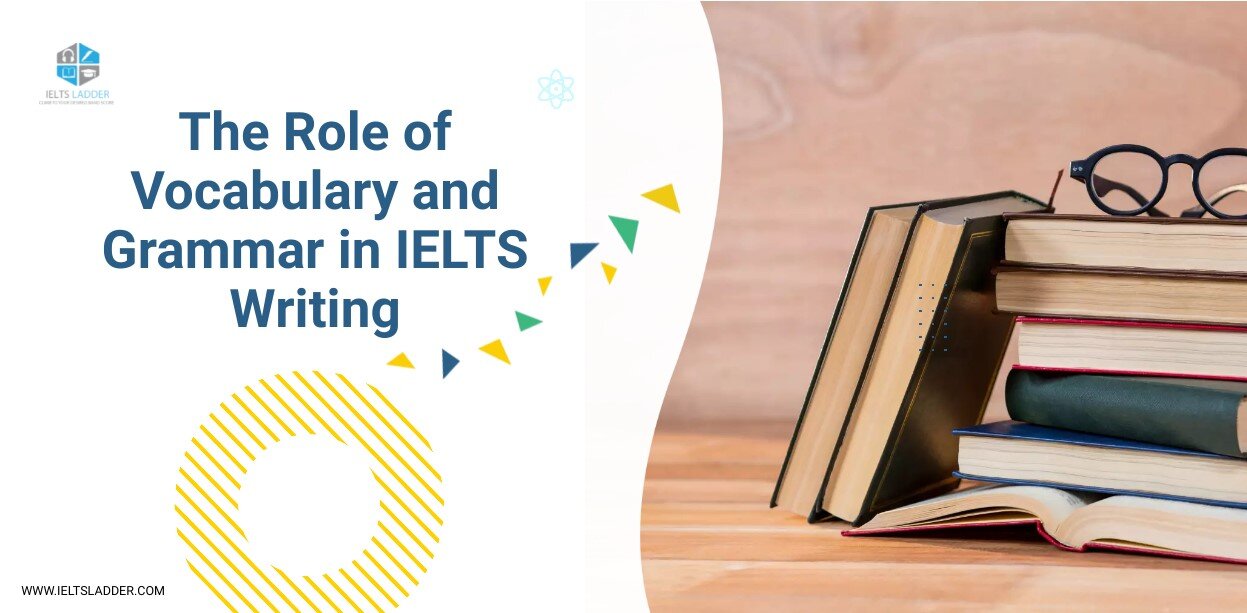8I IELTS Success Stories R Cleared GT Exam 8777 requirements...
Read More
The Role of Vocabulary and Grammar in IELTS Writing: Boosting Your Lexical Resource
The International English Language Testing System (IELTS) is a widely recognized exam that assesses a candidate's English language proficiency. There are two main types of IELTS tests: Academic and General Training. While the listening and speaking sections are the same for both, the writing section differs significantly. In this blog post, we will explore the key variations between IELTS Academic and General Training writing, along with valuable preparation tips to help you excel in either format.
The Significance of Vocabulary in IELTS Writing
Vocabulary serves as the building blocks of your writing. It's not just about using big words to impress; it's about expressing your ideas accurately, concisely, and effectively. Here's why vocabulary is crucial in IELTS writing:
Precision and Clarity:
The right choice of words helps you express your ideas clearly and precisely. A diverse vocabulary enables you to convey your thoughts without ambiguity.
Variation:
Examiners appreciate candidates who demonstrate a wide range of vocabulary. Using synonyms, antonyms, and idiomatic expressions showcases your ability to communicate effectively.
Lexical Resource Score:
In the IELTS writing assessment, one of the criteria is "Lexical Resource," which evaluates your vocabulary usage. A rich vocabulary contributes to a higher band score.
Strategies to Enhance Your Vocabulary
Read Widely:
Reading books, articles, and essays exposes you to various words and phrases. Pay attention to context and usage to grasp their meanings.
Create Vocabulary Lists:
Keep a notebook or digital document to jot down new words you encounter. Include their meanings, synonyms, and example sentences.
Contextual Learning:
Learn words in context. Understand how they are used in sentences, which aids in remembering and using them correctly.
Grammar: The Backbone of Effective Communication
Grammar is the framework that holds your writing together. It ensures that your ideas flow coherently, making your writing understandable and engaging. Here's why grammar is vital in IELTS writing:
Clarity:
Correct grammar ensures that your sentences convey your intended message clearly. Poor grammar can lead to confusion and misinterpretation.
Sentence Variety:
Proper grammar allows you to create diverse sentence structures, enhancing the rhythm and flow of your writing.
Grammar Score:
The "Grammar Range and Accuracy" criterion in IELTS assessment assesses your grammar usage. A strong grasp of grammar contributes to a higher band score.
Strategies to Improve Your Grammar
Study Grammar Rules:
Review essential grammar rules, such as tenses, subject-verb agreement, and sentence structure. Practice exercises to reinforce your understanding.
Proofread and Edit:
After writing, take time to proofread your work. Check for grammatical errors and correct them before finalizing your piece.
Learn from Feedback:
If you're using an IELTS writing correction service, pay attention to the grammar-related feedback. Use it to identify your weaknesses and work on them.
Balancing Vocabulary and Grammar
While both vocabulary and grammar are vital, striking the right balance between the two is essential. Overloading your writing with complex vocabulary might lead to unnatural or confusing sentences. Similarly, impeccable grammar without appropriate vocabulary might lack depth and variety. The key is to use sophisticated vocabulary when it enhances your writing and ensures it remains coherent.
In Conclusion
Vocabulary and grammar are the twin pillars of effective communication in IELTS writing. A strong vocabulary helps you express your ideas precisely, while impeccable grammar ensures clarity and coherence. By expanding your vocabulary through reading and contextual learning, and refining your grammar skills through study and practice, you can significantly boost your lexical resource and enhance your IELTS writing. Remember, mastering both components not only improves your writing but also contributes to a higher band score, leading you closer to your IELTS goals.

Get Your Writing Tasks Evaluated by an IELTS Expert
- Follow us on
Our Blog
- All about IELTS (Tips & Strategies) (16)
- IELTS Speaking (12)
- Recent Success Stories (24)
- Uncategorized (4)
- Writing Task 1 Model Answers (1)
- Writing Task 1(GT Letters) (38)
- GT Band 6 samples (1)
- GT Band 7 letters (10)
- Writing Task 2 Model Answers (59)
- Band 6 Samples (1)
- Band 6.5 Samples (4)
- Band 7 samples (10)
- Our Success Stories
Another IELTS Success Story
22I IELTS Success Stories Khyati, our student scored 7.5 Bands...
Read More- DON'T MISS
5 Must-Have Features of an Effective IELTS Writing Checker
5 Must-Have Features of an Effective IELTS Writing Checker The...
Read MoreMastering IELTS Writing: How an IELTS Writing Checker Can Boost Your Band Score
Mastering IELTS Writing: How an IELTS Writing Checker Can Boost...
Read MoreOur Services
{"title":"","show_title":"0","post_type":"product","taxonomy":"","term":"0","post_ids":"3541,1313,2395,1306","course_style":"rated","featured_style":"generic","masonry":"","grid_columns":"clear4 col-md-3","column_width":"268","gutter":"30","grid_number":"4","infinite":"","pagination":"","grid_excerpt_length":"100","grid_link":"1","grid_search":"0","course_type":"","css_class":"","container_css":"","custom_css":""}





